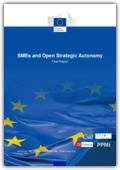
CSIL, in cooperation with IDEA Consult, PPMI and the London School of Economics’s Trade Policy Hub, has authored a study on SMEs and Open Strategic Autonomy. Open Strategic Autonomy refers to the EU’s capacity to act autonomously in strategically important areas while seeking multilateral cooperation where appropriate. This new paradigm represents a shift in trade and industrial policy, aiming to boost the EU’s production capabilities and diversify supply sources, thereby reducing external vulnerabilities and promoting sustainable strategic autonomy in key industrial sectors.
The study provided a granular analysis of the economic impact of Open Strategic Autonomy on the EU’s 24 million SMEs. The objective was to identify potential risks and opportunities for SMEs, map existing policy measures supporting strategic autonomy and SMEs, and propose policy advice at national, EU, and industrial ecosystem levels to maximise benefits for SMEs. The study provided an Action Plan for a more SME-centric Open Strategic Autonomy, which seeks to contribute to the policy dialogue between DG GROW and the SME Envoys Network.
The study covered all EU Member States and also collected information on selected non-EU countries, such as the USA, China, Canada, Japan, and India, to draw lessons from comparable policy paradigms.
? Full study SMEs and Open Strategic Autonomy
The study’s findings were also incorporated in the latest Annual Report on European SMEs 2023/2024.
Along with the final reports and annexes, we have also produced an infographic summarising the study’s main messages and action plan for an OSA that leverages SME capabilities to ensure more successful and sustainable EU policies.